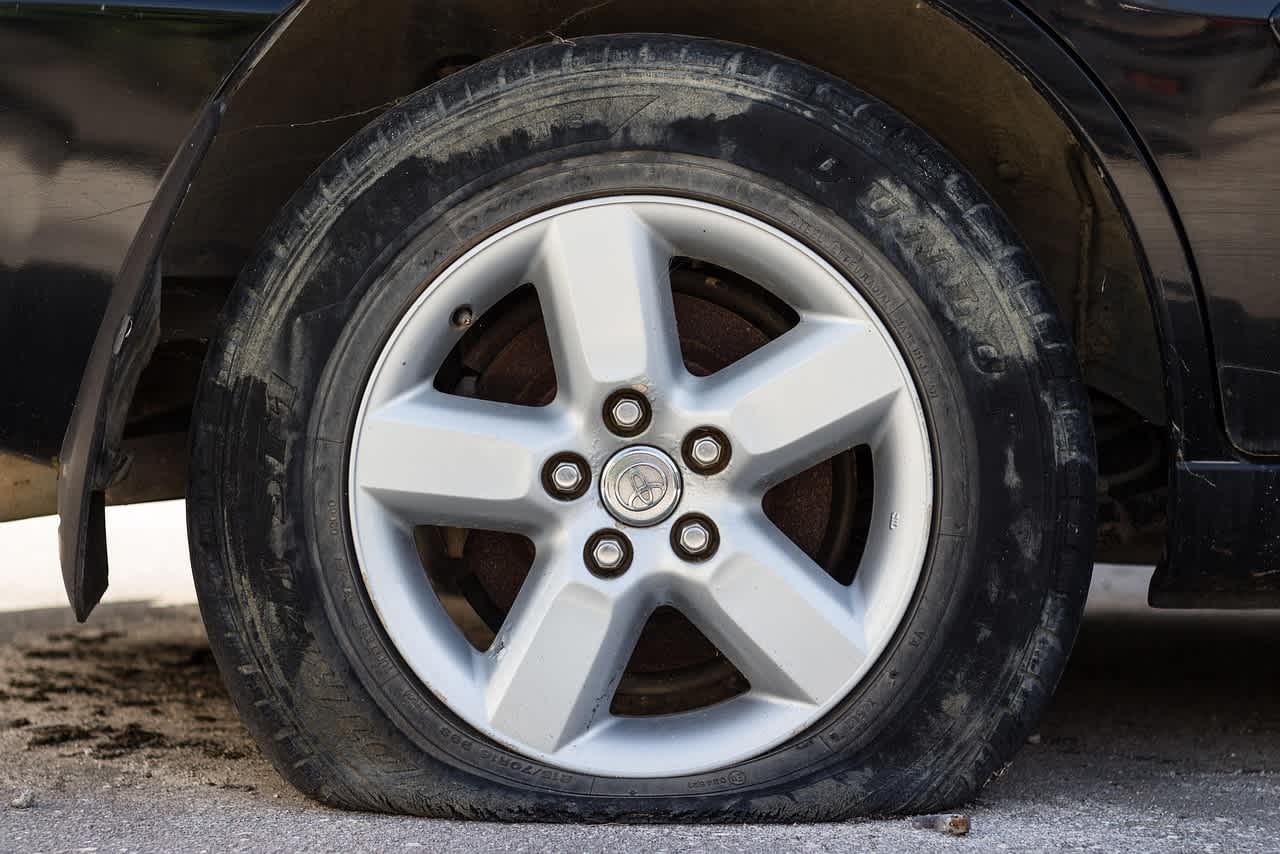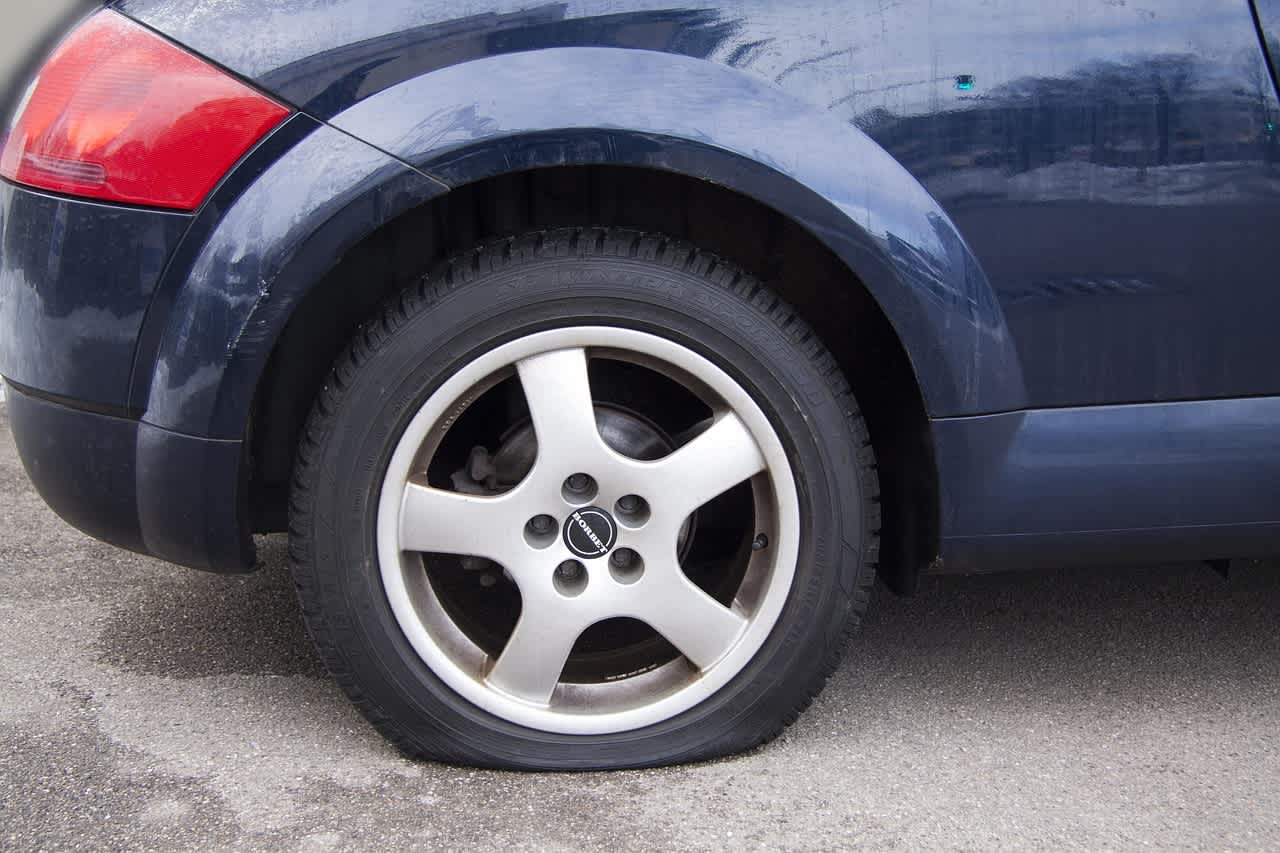Tire maintenance & safety
Free shipping
Best price guarantee
SimpleCrew exclusive savings
0% financing options
Tire replacement coverage
24/7 roadside assistance
Easy returns

A flat tire can happen to anyone at any time, often striking when you least expect it. Being stranded on the side of the road with a deflated tire is not only frustrating but can also be dangerous.
Fortunately, you can take proactive steps to minimize the risk and impact of a flat tire. By properly maintaining your tires, carrying the right tools, and knowing what to do in case of a flat, you'll be better equipped to handle this common roadside emergency.
Flat tire preparation is all about planning ahead and being ready for the unexpected. With a little knowledge and the right gear, you can confidently tackle a flat tire situation and get back on the road safely.
What is Flat Tire Preparation?
Flat tire preparation involves equipping your vehicle with the necessary tools and spare tire to handle a flat efficiently. It also means educating yourself on how to change a tire safely and what steps to take in case of a roadside emergency.
Having a well-maintained spare tire is crucial. Regularly check its air pressure and ensure it's in good condition, free from cracks or damage. Familiarize yourself with your vehicle's spare tire setup—is it a full-size tire, a temporary "donut" spare, or a tire repair kit? Knowing what you have and where it's located can save valuable time when you need it most.
Assembling a flat tire emergency kit is another key aspect of preparation. This kit should include essentials like a sturdy jack, lug wrench, wheel wedges, flashlight, gloves, and a tire pressure gauge. Some drivers also carry a portable air compressor and tire sealant for temporary fixes, which can be especially helpful for slow leaks. Having these tools readily accessible in your vehicle can make all the difference in a flat tire situation.
In addition to having the right equipment, flat tire preparation also involves regular tire maintenance. This includes monitoring your tire pressure, checking for uneven wear, and maintaining proper wheel alignment. By keeping your tires in top shape, you can reduce the likelihood of a flat and extend the life of your tires.
Remember, while it's important to know how to change a tire yourself, there may be situations where it's safer or more practical to call for roadside assistance. Familiarize yourself with the roadside assistance options available to you, whether through your vehicle's manufacturer, insurance provider, or a service like AAA. Keep relevant contact information easily accessible in your vehicle, so you can quickly call for help if needed.
In summary, flat tire preparation is about being proactive and equipped to handle a flat tire emergency. By maintaining your spare tire, assembling an emergency kit, practicing regular tire maintenance, and having a plan for roadside assistance, you'll be well-prepared to tackle this common roadside challenge with confidence.
How to Be Prepared for a Flat Tire

Preparedness for a flat tire requires more than a spare in your trunk. It involves a strategic approach to ensure you can tackle a flat tire situation effectively. This means having a comprehensive plan and essential resources at your disposal.
Essential Tools and Organization
Equip your vehicle with a dependable car jack and a lug wrench suited for your specific lug nuts. An extendable lug wrench provides the leverage needed for stubborn bolts. Include wheel chocks to secure your car from moving when lifted. Keep these tools neatly stored in your vehicle, allowing for quick access during emergencies.
Proactive Maintenance
Focus on tire upkeep to prevent potential flats. Regularly measure your tire pressure with an accurate gauge and assess them for any signs of damage or wear. Well-maintained tires not only decrease the likelihood of flats but also enhance vehicle performance. Additionally, adhere to a schedule for tire rotations and alignment checks to ensure even wear and extend their lifespan.
Knowledge and Readiness
Understanding how to utilize your tools is as crucial as owning them. Practice tire changes in a secure setting, such as your driveway, to build confidence with the procedure. Familiarize yourself with the manufacturer's recommended jack points on your vehicle to prevent any damage during a tire swap.
Incorporating these practices into your routine vehicle maintenance will prepare you to manage a flat tire scenario efficiently and safely.
1. Check Your Spare Tire
Your spare tire serves as a crucial backup, ensuring you're not left stranded. Regular inspections are vital: assess its air pressure monthly and look for any visible damage or wear. This proactive approach keeps your spare ready for immediate use.
Knowing the specifics of your spare tire is key. Some vehicles feature a robust full-size spare, while others rely on a compact spare designed for temporary use. Each type has different capabilities and limitations, so it’s essential to know the specifics to manage expectations during a flat tire situation.
Make sure the spare tire is easily accessible. Familiarize yourself with its storage location—common spots include beneath the trunk floor or attached to the vehicle's undercarriage. Practicing how to retrieve it ensures you're prepared to act quickly and efficiently in an emergency, saving precious time and reducing stress.
2. Assemble a Flat Tire Emergency Kit
An emergency kit tailored for flat tires is indispensable for any vehicle owner. This kit should be a compact yet comprehensive collection of tools and supplies to ensure you're prepared for unexpected tire issues. Start with crucial items like a reliable car jack and a versatile lug wrench. These tools are essential for lifting your vehicle and loosening the wheel nuts. Consider a telescoping lug wrench for added torque and ease of use compared to basic models.
Visibility is key during a roadside emergency. Equip your kit with a heavy-duty flashlight to ensure you can work safely in low-light conditions. Store spare batteries in a sealed container to keep them dry and ready for use. Include a pair of rugged gloves to protect your hands and provide a firm grip on tools and tires, minimizing the risk of injury and enhancing handling precision.
To bolster your kit, add a few strategic extras. A compact air pump can swiftly address underinflated tires, allowing you to reach a service station for a permanent fix. An emergency tire repair spray serves as a stopgap for minor punctures, enabling short drives without compromising safety. These additions equip you to manage minor tire issues independently, reducing reliance on external assistance.
3. Regular Tire Maintenance
Consistent tire maintenance is crucial for preventing flats and ensuring peak performance. Keep an eye on tire conditions by looking for cuts, punctures, or any foreign objects that could lead to issues. Address any visible damage promptly to avoid unexpected problems on the road.
Focus on the health of your tire treads, as they are vital for traction and safety. Use a tread depth gauge to measure the grooves, ensuring they meet the recommended depth. Adequate tread helps the vehicle grip the road better, especially in adverse weather conditions. Regularly rotate your tires according to your vehicle's manual to ensure even wear, which maximizes their lifespan and maintains optimal handling.
Proper wheel alignment is essential for vehicle stability and efficiency. Misalignment can lead to issues like uneven tire wear and compromised vehicle control. After significant impacts, such as hitting a pothole, have your alignment checked by a professional. This ensures your tires wear evenly and your vehicle remains safe to drive.
4. Know How to Use Your Tools
Proficiency with tire-changing tools is crucial for addressing a flat tire effectively. Begin by familiarizing yourself with the operation of each tool, focusing on the jack. This tool is essential for lifting your vehicle, granting access to the tire that requires changing. Take time to learn how to position and operate the jack correctly, practicing in a controlled environment like your garage to ensure you can perform this task smoothly when needed.
The lug wrench is indispensable for managing the lug nuts that secure your tire. Gain confidence by simulating the process of loosening and tightening these nuts, ensuring you understand the mechanics involved. This practice not only prepares you for real-world situations but also enhances your ability to perform under pressure.
Identifying the precise jack points on your vehicle is critical to maintaining its structural integrity during a lift. These reinforced locations are tailored to support your vehicle’s weight safely. Consult your vehicle’s manual to locate these points and practice positioning the jack accordingly. This preparation guarantees both the safety of your vehicle and the stability of the lift, offering reassurance during an actual tire change scenario.
5. Plan for Roadside Assistance
Ensuring you have access to professional support when needed is crucial for handling unforeseen roadside challenges. While equipping yourself to handle a tire change is beneficial, there are situations where expert intervention is the preferred option. Consider subscribing to a comprehensive roadside support program that provides essential services like towing and emergency tire changes. These programs, often offered by insurance companies or vehicle manufacturers, provide peace of mind with a wide array of assistance options.
To facilitate quick access to these services, store the details of your chosen roadside support provider in a convenient location within your vehicle. Utilize multiple formats—such as a printed card in the glove compartment and saved contact numbers in your phone—to ensure you're prepared even if one method is inaccessible. Familiarize yourself with the specifics of your plan, including any geographical limitations or extra charges, to avoid surprises during critical moments.
In situations where immediate assistance is necessary, having a reliable service at your fingertips can significantly reduce stress. Tailor your roadside support plan to accommodate your driving patterns and comfort level with emergency situations, ensuring that you're well-prepared for any eventuality on the road.
Tips on Handling Flat Tire Situations
1. Stay Composed
Encountering a flat tire can be unsettling, especially in busy traffic or unfamiliar surroundings. Begin by taking a deep breath and maintaining composure—this enables you to evaluate the situation effectively and prioritize your actions. Keeping a clear mind allows you to address the task at hand with precision, minimizing the chance of errors during the tire-changing process.
2. Prioritize Safety
Safety should be your foremost concern when dealing with a roadside tire issue. Start by steering your vehicle to a secure, level area away from oncoming traffic. Immediately engage your vehicle’s hazard lights to notify other drivers of your situation. This not only increases your visibility but also signals to others that you are handling a roadside emergency, encouraging them to exercise caution as they pass.
Once parked, utilize reflective triangles or road flares to further enhance visibility, especially in dim light or adverse weather conditions. Place these warning devices at a safe distance behind your vehicle to establish a secure perimeter, ensuring that approaching motorists can see you well in advance. By taking these steps, you create a safer environment for yourself and those around you while you work on resolving the flat tire.
At SimpleTire, we understand the importance of being prepared for a flat tire emergency. That's why we offer a wide selection of high-quality tires and helpful resources to keep you safe on the road. Shop for tires online and find the best deals with us today, so you can drive with confidence knowing you're ready for anything.
Ready to find the perfect tires?
Search By